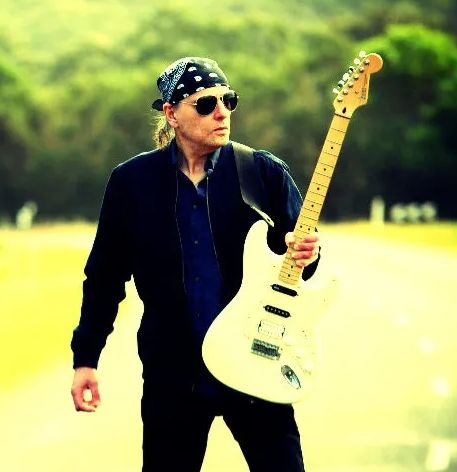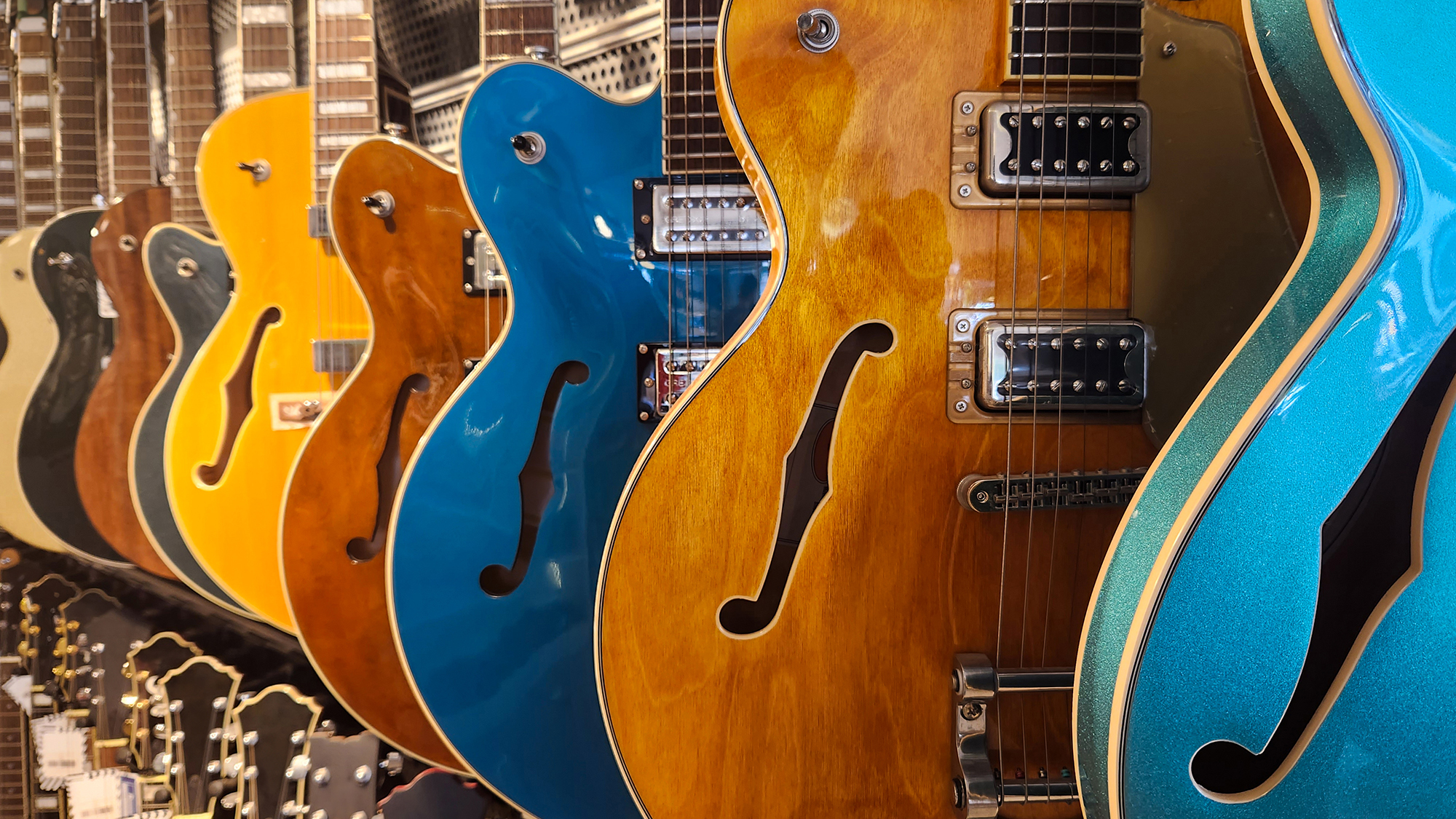“They probably only made two or three of them, but there’s a signature Burns Chris Stein Scorpion out there somewhere”: Ahead of a new Blondie album, Chris Stein talks folk and jazz influences, fighting with early effects, and his MIDI future
The co-founder of one the most beloved bands of the '70s and '80s recalls taking advantage of the time when they could go crazy in the studio, the one guitar he wishes he’d never sold, and another that you’ll recognize if you own it

All the latest guitar news, interviews, lessons, reviews, deals and more, direct to your inbox!
You are now subscribed
Your newsletter sign-up was successful
Formed in 1974 by guitarist Chris Stein and lead singer Debbie Harry, Blondie were pioneers in straddling the divide between new wave and punk and turning it into a palatable mix that took the band to worldwide success.
With the band still touring regularly, and putting out new material, they’re finding new and younger audiences as each year passes. As the band’s sonic architect, Stein’s six string stylings have been an integral element to the group’s musical evolution and signature sound.
Ahead of the June 11 release of his memoir Under a Rock and a new Blondie album out next year, Stein looked back on his remarkable career.
You’re most identified with playing a Strat. What influenced you to choose that guitar?
“It was because of Jimi Hendrix – he was maybe my favorite guitarist from the early days. All those old records of his, instrumentally, really hold up. His playing almost kind of falls into a kind of jazz category.”
For many years you also played a black 1956 maple neck Fender Strat.
“Actually, it was a sunburst colored Strat, but I put electrical tape around it and made it black. It was an interesting old guitar – someone had drilled the peg head for a lefty, so the pegs were coming off the other side.
All the latest guitar news, interviews, lessons, reviews, deals and more, direct to your inbox!
“Then somebody else had sealed the holes really neatly with little dowels, and done a good job with sanding it. So it had these little wooden dots all in a straight line on the peg head.
“If anybody has that guitar now it would be very recognizable. I don’t know what happened to it. I did have quite a few black Strats, but they were just factory black Strats. And the reason why I liked the maple necks was because it was brighter-sounding.”
You also played Burns guitars, specifically the Black Scorpion, which was often seen in your hands.
“I was lucky enough to meet Jim Burns and get to know him when he did the Black Scorpion for me. It reminded me of the way I had taken a rotary rasp on a hand drill to a Telecaster and carved up it up.
“I had been aware of Jim, and by that point I had a Scorpion, along with a Burns Jazz and maybe a couple of those Burns Bisons too – the ones with the ‘wild dog’ settings.
“Jim came to one of our gigs in London and we got to hang out with him. It very nice. I actually designed a peghead with him, and then very recently somebody sent me photos of a Chris Stein model that he’d made. They probably only made two or three of them, but there’s a sort of signature Chris Stein Scorpion out there somewhere in the world.”
What guitars do you play nowadays?
“I really like the True Temperament guitar. I play that a lot when we’re recording – the one with the squiggly frets. I think that’s a terrific guitar to play. I used that on our next Blondie record, which we’ve finished recording but hasn’t come out yet.”
You used to have a huge collection, but you sold off a lot of guitars. Are there any you wish you hadn’t gotten rid of?
“Yes! I had a Gibson Trini Lopez custom that was a really great guitar. And I wish I still had that guitar with me. I also had a brand new 1964 Fender Strat, which was still in its case and still had the tags on it.
I consider John Fahey a big influence and hero… I got to speak to him and even almost produced him
“I never took the tags off – it was just sitting, laying there in my room. So stuff like that is now gone. I still have a lot of cool guitars though.”
Your technique is based around the use of finger picks. Is that due to your love of folk guitar music?
“Definitely. I’m a guy whose playing comes out of all that folky stuff. Prior to guitar, I dabbled with a five-string banjo a little bit. And I played a lot of lap steel too. I consider John Fahey a big influence and hero to me. I got to see him a couple of times live. I got to speak to him and even almost produced him.”
Blondie’s 1980 album, Autoamerican, was such a change of direction for the group, and musically ahead of its time.
“Yeah, that was the big era, when we got to go crazy. That was big production. We had the orchestra. We had Tom Scott, who played the saxophone part on Rapture, and who also had played the theme to the film Taxi Driver. Jazz bassist Ray Brown played bass on one track, Faces. There was a lot of people and it was all good stuff.”
Producer Mike Chapman is credited with playing a large part in helping Blondie break into the mainstream.
“Mike was was like the George Martin for Blondie – and though he would make you do parts over and over again, it was great. I mean, it just changed my whole approach to recording. After all, art has to be… you have to be able to do that repetition, whatever it is.”
Are there any guitar parts on record that you are personally really proud of?
“There’s some good solos here and there. Guitar parts are just all kind of built into the songs. Shayla is pretty cool, on the Eat To The Beat album. I liked a lot of that psychedelic stuff I did – to me it was very interesting.”
Your guitar approach was more akin to a painter and their canvas; you focused more on adding textures using everything from an EBow to tape delays.
I played with a lot of people in live situations; some are just playing their parts rhythmically, some are trying to blend the parts
“I used a lot of chorus and space echos, especially those old Roland tape delays like you hear on Heart of Glass. It sounds like it’s a synth, but I’m actually doing those things with the guitar, and it’s sort of just in the background. Then I added in the pulse guitar – which, by the way, took so long to do because it was all done just with a tape delay.
“My playing has always been very emotional too. I would always try to be blending the parts with my playing, especially with the live gigs. I played with a lot of people in live situations; some people are just playing their parts rhythmically, and some people are trying to blend the parts.
“I don’t know – maybe it’s something that's a little more like jazz. I was always about listening to other parts and trying to fit in; trying to weave things together with what I was playing.”
Do you keep up with what’s happening on the current music scene?
“I like all kinds of music. I do always see new stuff, and I do like a lot of stuff that I hear. I see a lot of guitar-playing kids online that are just fantastic. It’s all a different standard now.”
You’ve been diagnosed with the heart condition atrial fibrillation, and you’re also living with prostate cancer, which has stopped you from joining Blondie onstage. Has your health affected the way you play?
“While I’m not touring, I’ve spent a bunch of time writing my upcoming memoir, Under A Rock. So I'm playing a little less, but I still pick up occasionally. I’ll be using a lot of MIDI triggers when I start doing some more music with the computer again. I have a couple of MIDI trigger guitars.”
And, as you mentioned earlier, there’s a Blondie album coming out soon?
“Yeah, we definitely have another one in the can. We’re just getting it mixed at the moment; hopefully it will be out at some point in the near future.”
- Blondie are on tour now. Chris Stein's memoir, Under a Rock, is out on June 11.
Joe Matera is an Australian guitarist and music journalist who has spent the past two decades interviewing a who's who of the rock and metal world and written for Guitar World, Total Guitar, Rolling Stone, Goldmine, Sound On Sound, Classic Rock, Metal Hammer and many others. He is also a recording and performing musician and solo artist who has toured Europe on a regular basis and released several well-received albums including instrumental guitar rock outings through various European labels. Roxy Music's Phil Manzanera has called him, "... a great guitarist who knows what an electric guitar should sound like and plays a fluid pleasing style of rock." He's the author of Backstage Pass: The Grit and the Glamour.




